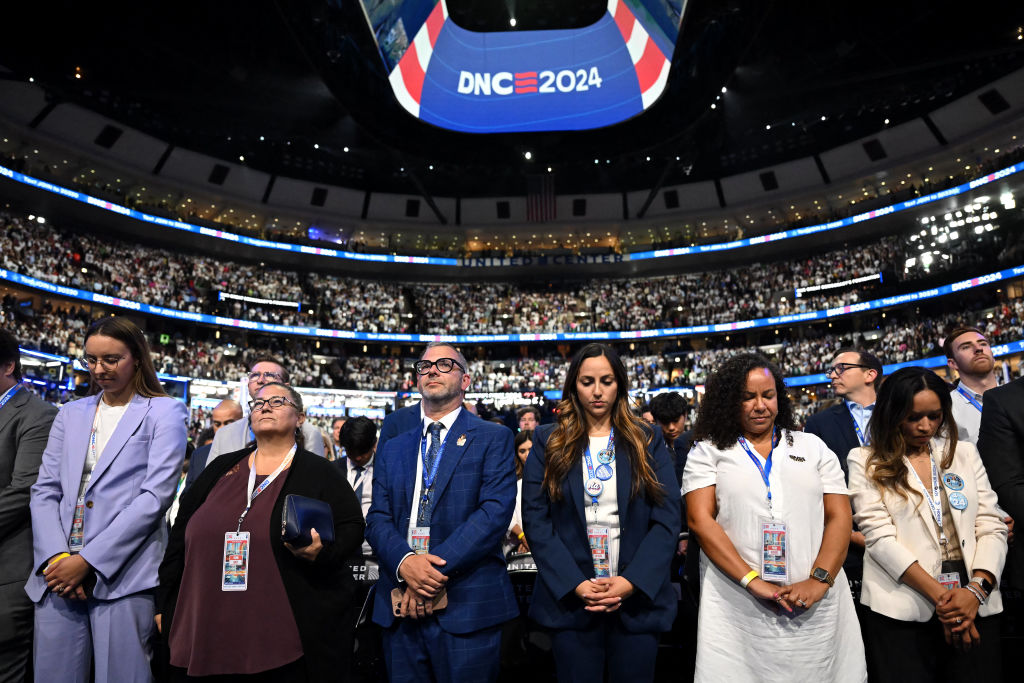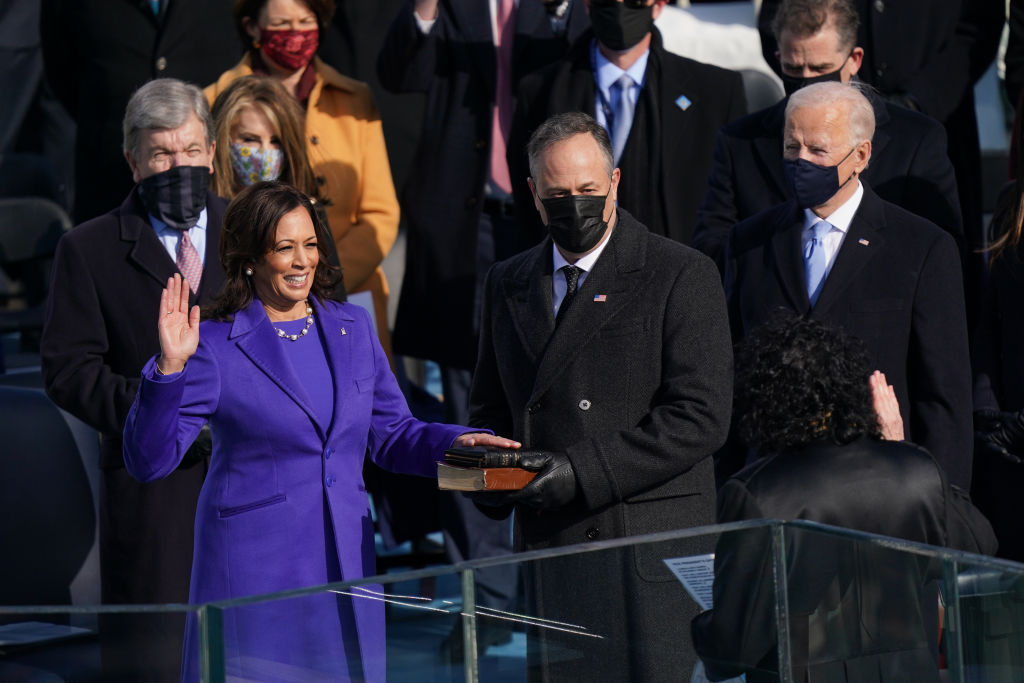
Delegates pray during the opening prayer on the fourth and last day of the Democratic National Convention (DNC) at the United Center in Chicago on August 22, 2024. | Source: ANDREW CABALLERO-REYNOLDS / Getty
As the Democratic National Convention ends, it’s hard not to notice the difference between the hyped-up, hopeful atmosphere in Chicago and the more serious, nationalist energy at the Republican National Convention just a month earlier. The two assemblies couldn’t be more different yet they did have something in common: Both assemblies fused faith with politics in an effort to rally their delegates.
Speakers at both conventions included leaders from various religious communities leading prayers and delivering speeches in support of either candidate. While both the RNC and the DNC invoked a lot of religious symbolism and speeches about God, there was a big difference between what the two parties had to say. While the Republican coalition invoked the image of God to spread a message of spiritual warfare and further stoked growing divisions among the American people, the DNC stage showcased a more optimistic side of spirituality with an emphasis on hope for the country and for the people of the world.
At The DNC, Sen. Raphael Warnock Showcased The Persuasive Power Of Southern Black Church Traditions
Both conventions opened with prayer from local religious leaders. Milwaukee Archbishop Jerome Listecki delivered the opening prayer on the first day of the Republican National Convention in Milwaukee, Wisconsin on July 15, and Cardinal Blase Cupich, who oversees the Archdiocese of Chicago, opened for the DNC. While Listecki’s prayer included quoting the Declaration of Independence, calling on God to “protect the military and police” and to remind the American citizens to be “grateful, Cardinal Cupich’s prayer was one asking for “peace…for people suffering the senselessness of war,” and for Americans to realize “dreams and see visions of what, by [God’s] grace, our world can become.”
The DNC continued with spiritual messaging about increasing faith in the future throughout the week. Representative Hakeem Jeffries, inspired by the 30th Psalm, delivered a speech about joy and Senator Raphael Warnock moved the delegates to tears with an impassioned call to heal this land.
Faith took on a different meaning at the RNC. Despite merchandise for sale that includes “God Bless The USA” Bibles and T-shirts that read, “God (and a good guy with a gun) Saved America,” the spiritual focus at the RNC was not so much on how God has blessed America, but on how God has blessed former president Donald Trump specifically.
“God spared President Trump from that assassin because God isn’t finished with him yet,” Arkansas Gov. Sarah Huckabee Sanders said on the second night. Rep. Marjorie Taylor Greene of Georgia, who openly identifies as a Christian nationalist, told the convention, “I thank God that his hand was on President Trump.”
Multiple religions were represented on both convention stages however, the reception of some were more welcomed than others. Republican Jewish Coalition CEO Matthew Brooks spoke at the RNC followed by Harmeet Kaur Dhillon of the Republican National Committee for California who delivered a Sikh prayer that some at the assembly incorrectly derided as a “Satanic Hindu prayer.”
There was a diversity in religious representation and mostly positive, inspiring messaging, but everything wasn’t in perfect peace at the DNC. While the family of an Israeli hostage was given the opportunity to speak on the stage, a Palestinian speaker from the Uncommitted Delegation was not permitted to deliver a vetted speech on the DNC stage. As a result, the Muslim Women for Kamala disbanded and withdrew their support for Harris as the candidate during the convention.
The number of Americans who don’t practice any specific religion has increased over the years, yet many Americans still have a strong sense of spirituality and connection to God, according to the Public Religion Research Institute. Both parties put faith and religion at the forefront at their conventions but with different results. While Democratic delegates were beseeched to care for their neighbors and spread a message of hope, the RNC doubled down on the Trump administration’s push for Christian nationalism with a focus changing policy to reflect specific Christian doctrine rather than the freedom of all forms of worship and religion that’s guaranteed in the Constitution.
Regardless of the efficacy of the spiritual messaging during convention season, faith in either candidate will be put to the test at the polls on Nov. 5.
SEE ALSO:
5 Takeaways From Kamala Harris’ Historic Acceptance Of The Democratic Nomination
Van Jones Praises Amber Rose’s RNC Speech, Predicts Her ‘Political Future’
The post America’s Divided Soul: Comparing Spiritual Messages At The DNC And RNC appeared first on NewsOne.

